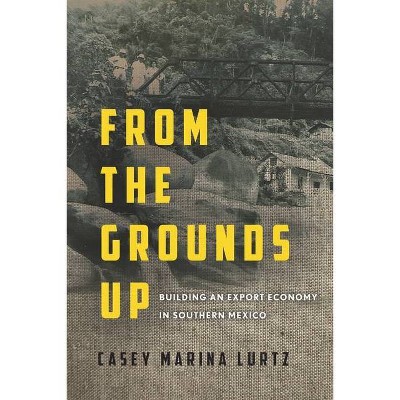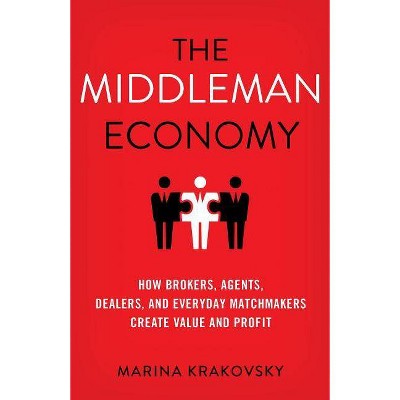From the Grounds Up - by Casey Marina Lurtz (Hardcover)

Similar Products
Products of same category from the store
AllProduct info
<p/><br></br><p><b> Book Synopsis </b></p></br></br><p>In the late nineteenth century, Latin American exports boomed. From Chihuahua to Patagonia, producers sent industrial fibers, tropical fruits, and staple goods across oceans to satisfy the ever-increasing demand from foreign markets. In southern Mexico's Soconusco district, the coffee trade would transform rural life. A regional history of the Soconusco as well as a study in commodity capitalism, <i>From the Grounds Up</i> places indigenous and mestizo villagers, migrant workers, and local politicians at the center of our understanding of the export boom.</p> <p>An isolated, impoverished backwater for most of the nineteenth century, by 1920, the Soconusco had transformed into a small but vibrant node in the web of global commerce. Alongside plantation owners and foreign investors, a dense but little-explored web of small-time producers, shopowners, and laborers played key roles in the rapid expansion of export production. Their deep engagement with rural development challenges the standard top-down narrative of market integration led by economic elites allied with a strong state. Here, Casey Marina Lurtz argues that the export boom owed its success to a diverse body of players whose choices had profound impacts on Latin America's export-driven economy during the first era of globalization.</p><p/><br></br><p><b> Review Quotes </b></p></br></br><br>[<i>From the Grounds Up</i>] is an excellent contribution to the historiography of export crops. It has important evidence and insights into the development of local solutions to crucial impediments to export development, especially the lack of credit institutions and a body of accepted business regulations, and into the role of foreign enterprise in the Mexican economy.--Mark Wasserman "<i>Comparativ</i>"<br><br><i>From the Grounds Up</i> is a compelling history of the ways in which individuals in one isolated region of Mexico both used and shaped institutions as it became a dynamic coffee exporter at the end of the nineteenth century....Lurtz's perspective offers important correctives to many top-down historiographic traditions.--Gail Triner "<i>H-Environment</i>"<br><br>[<i>From the Grounds Up</i>] is a remarkable scholarly achievement. It is a model of careful and patient archival work with dense and often quantitative sources....Graduate students in all kinds of seminars should dissect the book not only for its content but also as a study in how to transform unwieldy archival material into a digestible monograph.--Timothy W. Lorek "<i>H-Environment</i>"<br><br>[<i>From the Grounds Up</i>] paints a compelling picture of a region with its own multivalent geographic personality. To Lurtz's great credit, that sensibility of place suffuses the rest of the book....In Lurtz's hands, the Soconusco becomes a social landscape every bit as complex as its ecological one.--Christopher Boyer "<i>H-Environment</i>"<br><br>A creatively conceived, meticulously researched, beautifully written, and cogently argued fusion of environmental, socioeconomic, and political history. Lurtz combines local specificity and global perspective in a fascinating account of how a region in Chiapas that went from cradle of the cacao trade to forgotten backwater became Mexico's main exporter of coffee and a multinational hub of local and Guatemalan farmers, German colonists, Chinese merchants, and others.--José C. Moya, Barnard College "Columbia University"<br><br>Casey Lurtz's book is a remarkable contribution to our understanding of capitalist development in Mexico through the last 150 years. Her subject is the coffee business in Chiapas, not in the much studied highlands, but down on the coast, where the stakes were in cash and credit. Her research is original, her discoveries new, her arguments clear, sharp, and strong, and her exemplary stories a joy to read.--John Womack, Jr. "Harvard University"<br><br>Lurtz succeeds in providing a particularly nuanced and complex understanding of how the export-economy model developed in late nineteenth-century Mexico. The result is a particularly welcome contribution to the field that will force scholars to rethink long-held assumptions about the experience of the Export Economy period.--Will Fowler "<i>Journal of Interdisciplinary History</i>"<br><br>Lurtz's central contribution is her focus on bringing Latin Americans, not large-scale plantation owners, but villagers and locals, to the fore of this economic history....<i>From the Grounds Up</i> has sweeping implications on how historians think about the connection between Latin American export economies of the 19th century and state-building more broadly.--Jennifer Eaglin "<i>H-Environment</i>"<br><br>This exhaustively researched book provides an excellent study of grassroots state-building and entrepreneurism in a peripheral, borderland region of a peripheral state. Lurtz writes extremely well and uses poignant case studies to 'hook' the reader into each of her chapters. Her well-founded conclusions challenge the conventional wisdom on state-building, liberalism, land privatization, and debt peonage.--Stephen Lewis "<i>H-LatAm</i>"<br><br>With its extensive local research, Casey Lurtz's <i>From the Grounds Up</i> provides fresh insights into the construction of export economies and the integration of global markets....The book's innovative structure makes it particularly valuable for historians of global capitalism, export agriculture, and Latin American development. For historians of Mexico, its bold stake in the debate around obstacles to growth makes it essential.--Susan Gauss "<i>Business History Review</i>"<br><p/><br></br><p><b> About the Author </b></p></br></br><b>Casey Marina Lurtz</b> is Assistant Professor of History at Johns Hopkins University.
Price History
Cheapest price in the interval: 65 on November 8, 2021
Most expensive price in the interval: 65 on December 20, 2021
Price Archive shows prices from various stores, lets you see history and find the cheapest. There is no actual sale on the website. For all support, inquiry and suggestion messages communication@pricearchive.us




















